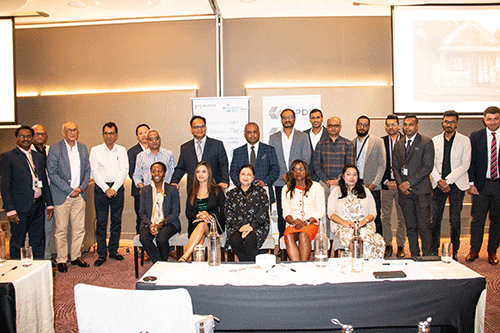Namibia understands the importance of enhancing intra-Africa trade, creating synergies and an enabling environment to unlock opportunities for sourcing materials and intermediate products while promoting economic self-sufficiency.
This is according to deputy executive director in the trade ministry Ndiitah Nghipondoka-Robiati, who was speaking on Monday during a Namibia-Mauritius business forum.
Nghipondoka-Robiati noted that one of the ministry’s mandates is to promote economic growth and development, through the formulation and implementation of appropriate policies with the view to attract investment and increase trade, as well as develop and expand Namibia’s industrial base.
“The ministry is committed to continue creating an enabling environment for trade and investment opportunities regionally and globally,” said Nghipondoka-Robiati at the forum in Windhoek.
She noted that by connecting with Mauritian buyers, distributors and business partners, domestic economic growth will be stimulated.
She added: “Namibia and Mauritius share several similarities, including a shared interest in the tourism sector and regional alignment in terms of trade relations and economic groupings. Both countries are members of SADC and Tripartite (EAC, SADC and COMESA), and they are part of the Africa Continental Free Trade Area (AfCFTA). These economic groupings offer significant opportunities – and with platforms like this, we can reap the benefits equitably provided by these agreements to the benefit of our people and economies”.
She added that regionally, the ground is fertile, with the AfCFTA creating a platform where logistics and supply chains can garner the efficient movement of goods and services in the region.
“Namibia recognises the importance of intra-regional trade, and it is eager to engage in the discussions that can lead to smoother transportation and distribution processes,” said Nghipondoka-Robiati.
Executive director for MSME Development at the Namibia Investment Promotion and Development Board (NIPDB) Dino Ballotti concurred with Nghipondoka-Robiati that this is not just another engagement by two like-minded countries, who not only share a pro-active but also intentional approach to collaborate in unlocking the opportunities of the AfCFTA.
“As brother countries within the SADC, we are here to forge meaningful partnerships and stimulate like-minded trade collaborations. We have a commonality in that we both share a vision for 2030. Where Namibia’s vision is to be a prosperous and industrialised nation, Mauritius has the vision of addressing unemployment, eradicating poverty and being a high-income country by 2030. Our visions are very much aligned,” Balloti reflected.
He continued that Namibia has made significant strides in diversifying its economy, where it focuses on sectors such as agriculture, mining, manufacturing, tourism and renewable energy; hence, the country is “open for business if it is mutually beneficial and can create sustainable local jobs”.
Welcoming investments
Meanwhile, director of Economic Development of Mauritius Geerish Bucktowonsing said Namibia is a welcoming environment and a prospective destination for trade and investment.
Some 15 companies from Mauritius are showcasing their goods and services at the business forum, representing diverse sectors, such as textiles and apparel, detergents, cosmetics, packaging, stationery and paper, articles of plastics, furniture, metal fabrication and agro-processing.
“AfCFTA is a game-changer in terms of creating a bigger and integrated regional market for African products, permitting producers to benefit from economies of scale and to access cheaper raw materials and intermediate inputs,” said Bucktowonsing.
“Our products are reaching Namibia via South Africa – and this is about developing a new route to have volume and exchange, and that’s why we brought these companies here. There are many fields,” Bucktowonsing explained.
He added that the mission is to provide a win-win situation for the parties involved because, as a small African island, they have had a giving and sharing spirit, making it a “collaborative approach”.
“Namibia and Mauritius benefit from the African Growth and Opportunity Act (AGOA), and we have been a lead exporter within that agreement. Despite that, we are still exporting less than 1% of African volume. To mitigate this, you can’t do it alone; you need that collaborative approach,” he stated.
Bucktowonsing said Mauritius does not have raw materials, which is why “regional collaboration is important to see the upliftment of Africa in terms of economic growth”.
He said part of the reason for fostering trade and industrialisation ties is because of Namibia’s impressive and remarkable global rankings in gender-equal society index, environmental performance, freedom of the press and others. – psiririka@nepc.com.na


